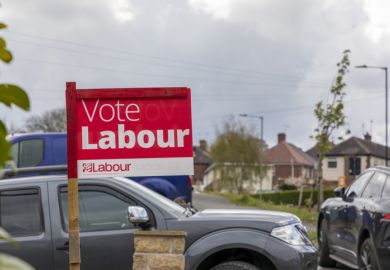Everyone thinks their own sector gets the worst press. It’s an inevitability I’ve seen from researching trust in institutions and industries for decades, across charities, the media and financial and political institutions.
We notice much more coverage about ourselves because we have an interest but, more than that, we’re hardwired to pay particular attention to negative information, because humans are attuned to picking up potential threats.
It should be no surprise then that public attitudes are much more positive than our own self-image of the sector. Indeed, in a survey of nearly 2,700 UK residents carried out by King’s College London’s Policy Institute, universities come behind only the NHS, the UK’s armed forces and the royal family in a league table of institutions considered among the best in the world. Universities are way ahead of schools, the police and the legal system – while government and parliament prop up the bottom of the list.
Looking over the long term, updating a question asked back in 1991, we’ve also seen a doubling in how satisfied the public is with how universities are performing their role in society, behind only the army, teachers, doctors and the NHS.
But there is a downside to not being thought about very much: we are rock-bottom among the public’s election priorities. Just 13 per cent pick out universities as an issue that will be important to their vote, compared with 65 per cent for the NHS and 60 per cent for the cost of living.
That low figure also reflects very low awareness of financial threat to the sector. It is forecast that 40 per cent of higher education providers will be in deficit this year, with 43 expected to record deficits for three straight years. But universities rank bottom of a list of institutions perceived as being under serious funding pressure (a list headed by hospitals).
It's no surprise, then, that the general election manifestos of the UK’s main two parties are relatively quiet on universities. Labour does explicitly concede that the sector is in “crisis”, but this is perhaps predictable from an opposition manifesto, and the document is quiet on how the party would deliver the “secure future” the sector is promised.
But Labour will quickly need to get serious about university funding if, as predicted, it wins the election, not least because the issue is not as free from political peril as the low salience for the public might suggest. Well over half of survey respondents would be worried if 30 to 40 institutions went bankrupt or, perhaps more importantly, if the university in question was the one they went to or in their local area. The proportion rises again among Labour supporters, who are more likely than Conservative supporters to be graduates and to live in towns and cities where universities are key anchor institutions.
One particularly telling stat is that the government is most likely to get the blame for closures among the public as a whole – and this increases to three-quarters of Labour supporters. Of course, this will partly reflect the fact that Labour supporters are no fans of the Conservative government – but it is likely to be particularly risky for a new Labour administration to be linked to early university closures.
There is one other clue in the findings to what a new government’s options may be to defuse the funding crunch. Compared with 2009, there has been a steep decline in the proportion of people who say any increased higher education funding should come from taxation. Today, there is a clear preference for greater contributions from graduates once they are benefitting financially from their degrees.
This reflects not just the UK’s record high tax levels and severe cost of living pressures but also a profound change in attitudes towards public services in recent decades. Back in 1988, 68 per cent thought universities should be mainly state-funded – now it’s just 19 per cent. This is one of the largest changes we’ve seen for any service, but the direction of travel towards individual responsibility is reflected in everything from healthcare to employment training.
Our more detailed statistical analysis on what’s most associated with positive and negative views of universities adds a further pointer on how the sector should make its case, and what we should avoid.
The key factor driving positive views is believing that UK universities both have a world-leading international reputation and play a positive role in local communities. The key factor associated with negative views is that universities are driven mainly by making a profit. These are much more important than other perceptions, such as around vice-chancellor salaries, free speech or even the value for money of degrees.
The study, then, has two main messages for the sector as the turbulent financial times continue under a probable new government. We should regain some sense of confidence in our extraordinary standing and power. But we should ensure this is very clearly used in service of local, national and global goals – not our own interests.
Bobby Duffy is professor of public policy and director of the Policy Institute at King’s College London.
Register to continue
Why register?
- Registration is free and only takes a moment
- Once registered, you can read 3 articles a month
- Sign up for our newsletter
Subscribe
Or subscribe for unlimited access to:
- Unlimited access to news, views, insights & reviews
- Digital editions
- Digital access to THE’s university and college rankings analysis
Already registered or a current subscriber?















